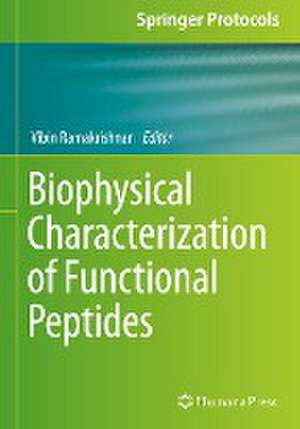Biophysical Characterization of Functional Peptides: Springer Protocols Handbooks
Editat de Vibin Ramakrishnanen Limba Engleză Hardback – 3 aug 2023
Din seria Springer Protocols Handbooks
- 18%
 Preț: 782.42 lei
Preț: 782.42 lei - 5%
 Preț: 1817.13 lei
Preț: 1817.13 lei - 18%
 Preț: 1120.18 lei
Preț: 1120.18 lei -
 Preț: 403.91 lei
Preț: 403.91 lei - 15%
 Preț: 662.30 lei
Preț: 662.30 lei - 18%
 Preț: 1855.11 lei
Preț: 1855.11 lei - 18%
 Preț: 1918.09 lei
Preț: 1918.09 lei - 18%
 Preț: 896.08 lei
Preț: 896.08 lei - 15%
 Preț: 644.82 lei
Preț: 644.82 lei - 20%
 Preț: 593.48 lei
Preț: 593.48 lei - 18%
 Preț: 966.27 lei
Preț: 966.27 lei - 5%
 Preț: 2329.29 lei
Preț: 2329.29 lei - 18%
 Preț: 952.09 lei
Preț: 952.09 lei - 5%
 Preț: 737.11 lei
Preț: 737.11 lei - 15%
 Preț: 648.24 lei
Preț: 648.24 lei - 18%
 Preț: 984.44 lei
Preț: 984.44 lei - 18%
 Preț: 977.34 lei
Preț: 977.34 lei - 18%
 Preț: 1674.20 lei
Preț: 1674.20 lei - 18%
 Preț: 1841.06 lei
Preț: 1841.06 lei - 18%
 Preț: 970.87 lei
Preț: 970.87 lei - 18%
 Preț: 1588.19 lei
Preț: 1588.19 lei - 18%
 Preț: 1029.13 lei
Preț: 1029.13 lei - 5%
 Preț: 677.07 lei
Preț: 677.07 lei - 18%
 Preț: 1250.74 lei
Preț: 1250.74 lei - 5%
 Preț: 723.78 lei
Preț: 723.78 lei - 18%
 Preț: 900.18 lei
Preț: 900.18 lei - 18%
 Preț: 800.55 lei
Preț: 800.55 lei - 15%
 Preț: 645.60 lei
Preț: 645.60 lei - 5%
 Preț: 1487.03 lei
Preț: 1487.03 lei - 15%
 Preț: 645.47 lei
Preț: 645.47 lei
Preț: 1110.41 lei
Preț vechi: 1354.15 lei
-18% Nou
Puncte Express: 1666
Preț estimativ în valută:
212.51€ • 221.04$ • 175.43£
212.51€ • 221.04$ • 175.43£
Carte tipărită la comandă
Livrare economică 14-28 aprilie
Preluare comenzi: 021 569.72.76
Specificații
ISBN-13: 9781071634042
ISBN-10: 1071634046
Ilustrații: XIV, 139 p. 46 illus., 25 illus. in color.
Dimensiuni: 178 x 254 mm
Greutate: 0.49 kg
Ediția:1st ed. 2023
Editura: Springer Us
Colecția Humana
Seria Springer Protocols Handbooks
Locul publicării:New York, NY, United States
ISBN-10: 1071634046
Ilustrații: XIV, 139 p. 46 illus., 25 illus. in color.
Dimensiuni: 178 x 254 mm
Greutate: 0.49 kg
Ediția:1st ed. 2023
Editura: Springer Us
Colecția Humana
Seria Springer Protocols Handbooks
Locul publicării:New York, NY, United States
Cuprins
Dedication.- Preface.- Acknowledgement.- Chapter 1 De novo Peptide Design Tools.-Chapter 2 Molecular Docking.- Chapter 3 Molecular Dynamics Simulations.- Chapter 4 Peptide Synthesis.- Chapter 5 Mass Spectrometry .- Chapter 6 Circular Dichroism (CD) Spectroscopy.- Chapter 7 Fourier Transform Infrared (FTIR) Spectroscopy.- Chapter 8 Cell Culture for Cell Penetrating Peptides.- Chapter 9 Comparative Uptake of Peptides by Flow Cytometry.- Chapter 10 Cellular uptake of peptides by confocal microscopy.- Chapter 11 Penetration in 3D Tumorospheres.- Chapter 12 TMRM Cytotoxicity Assay.- Chapter 13 Cell Death by Apoptosis.- Chapter 14 Hemolytic activity.- Chapter 15 Antimicrobial Assay.- Chapter 16 Antimicrobial assay with Peptide Based Hydrogels.- Chapter 17 Rheology of Peptide based Hydrogels.- Chapter 18 Estimation of Aggregation Kinetics.- Chapter 19 Assessment of Amyloid morphology using Electron Microscopy.- Chapter 20 Catalytic Efficiency of the Designed Peptides.
Notă biografică
Dr. Vibin Ramakrishnan is a Professor of Biosciences and Bioengineering at IIT Guwahati. He did his Master’s in Applied Chemistry from Cochin University of Science and Technology and Ph.D. from School of Biosciences and Bioengineering, IIT Bombay. He worked as a Postdoctoral Research Associate at Rennsselaer Polytechnic Institute, New York and a Faculty scientist at IBAB Bangalore, before joining Department of Biosciences & Bioengineering at IITG. He has published more than 50 research articles in reputed international journals and filed 10 patents, including an international patent to his credit. He is also the principal scientific advisor of two biotech companies.
The Department of Biotechnology, Govt. of India has awarded Dr. Vibin, the Innovative Young Biotechnologist Award (IYBA) in the year 2007-08 to recognize his contributions and for innovative approach in biotechnology research. Dr. Vibin is an editorial board member of Scientific Reports. He has more than15 years of teaching experience in Biophysics, Computational Biology, Bio-techniques, Analytical Biotechnology, and Proteomics. He is a member of many international scientific societies such as American Chemical Society, Biophysical Society, and Protein Society.
The Department of Biotechnology, Govt. of India has awarded Dr. Vibin, the Innovative Young Biotechnologist Award (IYBA) in the year 2007-08 to recognize his contributions and for innovative approach in biotechnology research. Dr. Vibin is an editorial board member of Scientific Reports. He has more than15 years of teaching experience in Biophysics, Computational Biology, Bio-techniques, Analytical Biotechnology, and Proteomics. He is a member of many international scientific societies such as American Chemical Society, Biophysical Society, and Protein Society.
Textul de pe ultima copertă
This protocol book presents reproducible and step-by-step procedures for the peptide synthesis, their characterization and applications. The volume includes an introductory section on in silico modelling of new peptide molecules, Molecular Dynamics Simulations, Docking, Electrostatic fingerprinting of peptides, and other modelling tools for peptide designing and optimization. Further, it covers protocols for the solid phase peptide synthesis, chromatographic and mass spectrometric characterization of peptides. Importantly, it covers methods for biophysical characterizations of peptides for their potential applications as drug delivery vehicles, peptide nano-assembly, bionanocatalysis, protein aggregation diseases, and peptide-based anti-bacterial.
Caracteristici
Discusses protocols for peptide synthesis and their biophysical characterizations Reviews the applications of Molecular Dynamics Simulation in structure prediction of peptides Shows methods for peptide characterization for the potential applications in drug delivery, protein aggregation studies
